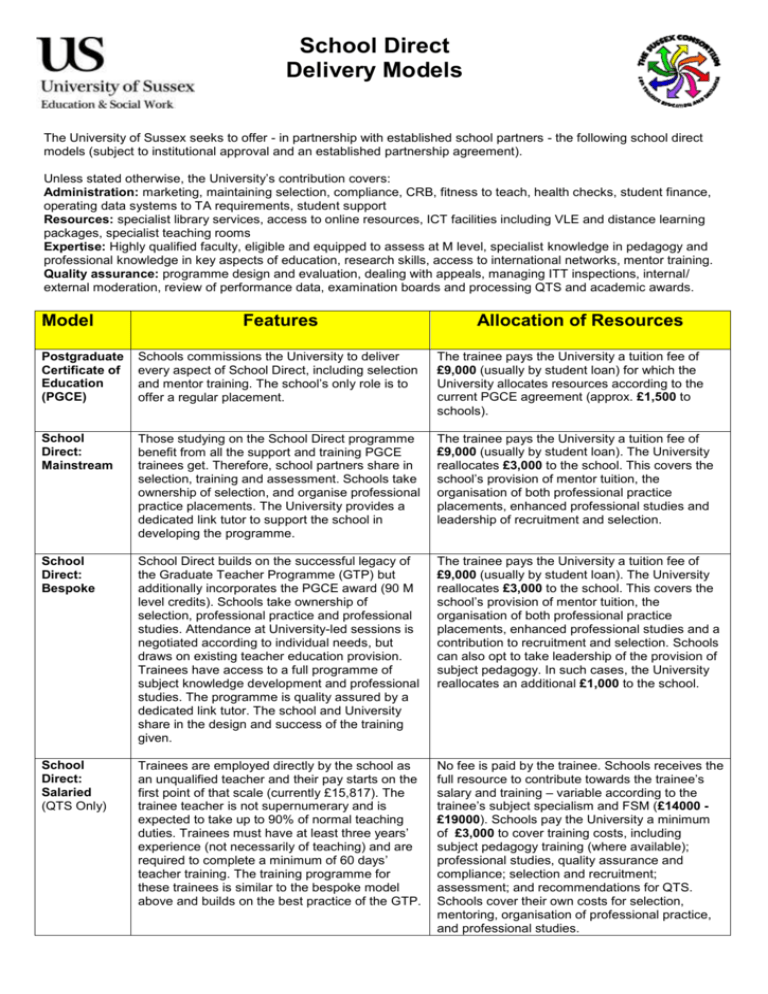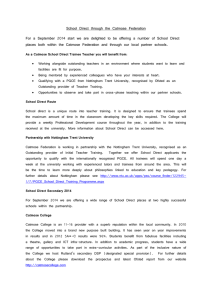The Sussex Consortium for Teacher Education and Research
advertisement

School Direct Delivery Models The University of Sussex seeks to offer - in partnership with established school partners - the following school direct models (subject to institutional approval and an established partnership agreement). Unless stated otherwise, the University’s contribution covers: Administration: marketing, maintaining selection, compliance, CRB, fitness to teach, health checks, student finance, operating data systems to TA requirements, student support Resources: specialist library services, access to online resources, ICT facilities including VLE and distance learning packages, specialist teaching rooms Expertise: Highly qualified faculty, eligible and equipped to assess at M level, specialist knowledge in pedagogy and professional knowledge in key aspects of education, research skills, access to international networks, mentor training. Quality assurance: programme design and evaluation, dealing with appeals, managing ITT inspections, internal/ external moderation, review of performance data, examination boards and processing QTS and academic awards. Model Features Allocation of Resources Postgraduate Certificate of Education (PGCE) Schools commissions the University to deliver every aspect of School Direct, including selection and mentor training. The school’s only role is to offer a regular placement. The trainee pays the University a tuition fee of £9,000 (usually by student loan) for which the University allocates resources according to the current PGCE agreement (approx. £1,500 to schools). School Direct: Mainstream Those studying on the School Direct programme benefit from all the support and training PGCE trainees get. Therefore, school partners share in selection, training and assessment. Schools take ownership of selection, and organise professional practice placements. The University provides a dedicated link tutor to support the school in developing the programme. The trainee pays the University a tuition fee of £9,000 (usually by student loan). The University reallocates £3,000 to the school. This covers the school’s provision of mentor tuition, the organisation of both professional practice placements, enhanced professional studies and leadership of recruitment and selection. School Direct: Bespoke School Direct builds on the successful legacy of the Graduate Teacher Programme (GTP) but additionally incorporates the PGCE award (90 M level credits). Schools take ownership of selection, professional practice and professional studies. Attendance at University-led sessions is negotiated according to individual needs, but draws on existing teacher education provision. Trainees have access to a full programme of subject knowledge development and professional studies. The programme is quality assured by a dedicated link tutor. The school and University share in the design and success of the training given. The trainee pays the University a tuition fee of £9,000 (usually by student loan). The University reallocates £3,000 to the school. This covers the school’s provision of mentor tuition, the organisation of both professional practice placements, enhanced professional studies and a contribution to recruitment and selection. Schools can also opt to take leadership of the provision of subject pedagogy. In such cases, the University reallocates an additional £1,000 to the school. School Direct: Salaried (QTS Only) Trainees are employed directly by the school as an unqualified teacher and their pay starts on the first point of that scale (currently £15,817). The trainee teacher is not supernumerary and is expected to take up to 90% of normal teaching duties. Trainees must have at least three years’ experience (not necessarily of teaching) and are required to complete a minimum of 60 days’ teacher training. The training programme for these trainees is similar to the bespoke model above and builds on the best practice of the GTP. No fee is paid by the trainee. Schools receives the full resource to contribute towards the trainee’s salary and training – variable according to the trainee’s subject specialism and FSM (£14000 £19000). Schools pay the University a minimum of £3,000 to cover training costs, including subject pedagogy training (where available); professional studies, quality assurance and compliance; selection and recruitment; assessment; and recommendations for QTS. Schools cover their own costs for selection, mentoring, organisation of professional practice, and professional studies.











